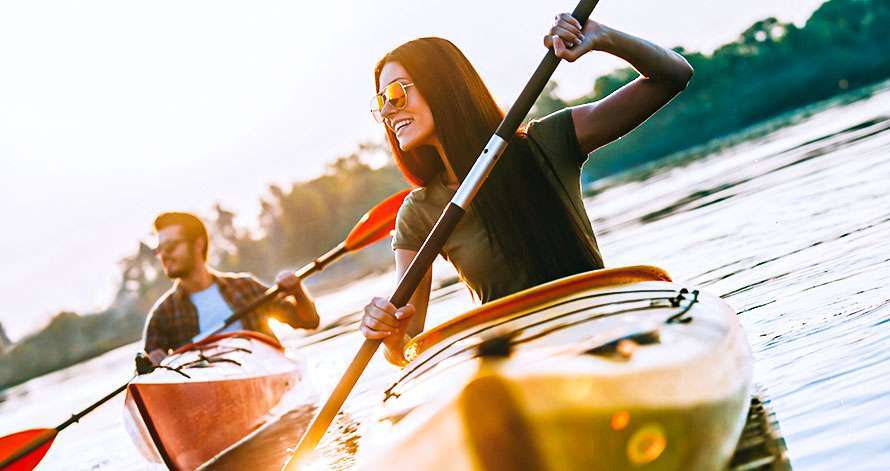As more and more women are actively participating in whitewater kayaking, the manufacturers of whitewater gears are leaving no stone unturned to tap into this huge opportunity. The industry is also responding to this emerging trend by flooding the market with proper whitewater kayaking attire and gear designed specifically for women. Now you might be wondering what is the point of launching a new line of whitewater kayaking gears for women when unisex gears are available? Well, you are wrong my friend. Women, just like men, have unique sizing needs and there is no way we can brush this need under the carpet.
To be honest, unisex sizing has always been more about men rather than women. It does not really work for women. Some of the aspects that need to be kept in mind while designing women’s whitewater kayaking gears are – narrow shoulder cut, smaller waist, non-binding fitting, small torso length, shorter Sleeve, larger hip area, and longer rise.
Each woman is different and therefore, fit-for-all size is not going to help you at all. So, to help you out, here we are going to give a rundown of top women’s whitewater kayaking gears so that you can have a great time ahead.
PFD
Love it or hate it, but the truth is, most of the PFDs that are available in the market are not designed specifically for women. Yes, it is a sad reality. But just because most PFDs are available in unisex sizes, it does not mean that you can’t find a PFD that suits your specific needs. There is only one factor that you need to keep in mind while buying a PDF for whitewater kayaking and that is – Comfort. To accommodate the large physique of men, unisex PFDs usually have larger cut in them but this large is extremely uncomfortable for short women.
Kayaking PFD for women is relatively a new thing. It is really strange that the industry took so long to notice the trend before mass producing women PFDs to cater to the needs of the women paddlers. Men and women have different physical structures and therefore, it is expected of the kayaking manufacturing companies to come up with PFDs designed specifically for women paddlers.
If you are a curvy woman, you need to find a women’s PFD with foam contour. That contoured foam will definitely add to the ‘’comfort’ that you have been looking for so long. Another thing about Women’s PFDs is that just because they are made specifically for women, it does not mean you will have to shell out extra dollars for that.
Choose a PFD that has large armholes. The flotations need to be positioned well below the arms and the shoulders. If you are looking for more ventilation, you will have to choose a woman’s PFD that has mesh in the lower back area. Inner cups are another factor that you need to keep into consideration while choosing whitewater PFD.
Helmet
Well, your brain is important too and which is why you need to invest in a proper kayaking helmet that can easily withstand impacts. Whitewater kayaking is not for the faint-hearted. There will be impacts and minor accidents but that should not deter you from enjoying whitewater kayaking. All you need is a kayaking helmet that can protect your head from impacts of underwater objects.
To be honest, I don’t think you will ever be allowed to participate in a whitewater kayaking if you decide not to put on a helmet. You need to choose a whitewater kayaking helmet which is made from non-absorbent materials otherwise, it will take forever to drain the water out. Kayaking Helmet with a brim is another popular choice as it helps to block the sun while paddling.
Paddle
Most people are not even aware of the fact that they need to have a specific paddle for whitewater kayaking. Nope, you are not allowed to use standard paddles and even if you are allowed to use standard paddles, it would not be of any help other than making you look stupid. Unlike recreational paddles. whitewater paddles tend to be more aerodynamic and more often than not, they are not collapsible in nature. They are even bigger and larger than the traditional sea kayaking paddles.
1. Straight Shaft & Bent Shaft Paddles
From the design standpoint, whitewater kayaking paddles can be broadly categorized into two sections – straight shaft and a bent shaft. Bent shaft paddles tend to inward bend to allow the paddler to provide some rest to his shoulders, elbows, hands, and wrists while paddling for long hours. However, straight shaft paddles don’t offer any such resting position.
People who are suffering from shoulders injury or have some sort of arm problems should always opt for bent shaft whitewater paddle. Straight shaft paddles are notorious for causing serious harms to shoulders.
2. Materials
The lighter the paddle is, the better it is for you. Whitewater kayak gear manufacturers are well aware of this issue and which is why they have doubled down on using composite materials to produce strong and lightweight whitewater paddles. Whitewater Paddles made from fiberglass are known for their great strength and they are available for the cheap. Compared to fiberglass paddles, carbon fiber paddles are expensive but they are even lighter than their fiberglass counterparts.
3. Length
The length of the whitewater paddle is another factor that you need to take into consideration while making a buying decision. For play freestyling, the short paddle is good whereas, for creeking and river rafting, the longer paddle would be the perfect pick. Ideally, for whitewater paddling, you need to choose a 194cm-203cm long paddle.
Spray Skirt
A spray skirt is an essential whitewater kayaking gear. Without a Spray skirt, your cockpit will be overflowing with water and making it almost impossible to concentrate on kayaking. Spray skirt acts as a barrier between the kayaker and the water. It stops the water from sipping in and thus helping then paddler to stay dry.
While selecting the right spray skirt for your kayak, you need to know the exact size of the cockpit. Failing to get the right size can cause a lot for trouble later. The spray skirt might come off if it is bigger and if it is too short, you will find it incredibly difficult to put on and put off. Now, for recreational kayaking, a neoprene spray skirt would be more than enough but the same can’t be said for whitewater kayaking. You will need a bungee to deal the cockpit tightly otherwise water will find a way in. Implosion resistance, durability, and materials are the three main factors that you need to keep in mind while selecting a Spray Skirt for a whitewater kayaking adventure. Spray Skirt made from high-grade neoprene and further reinforced with Kevlar is the best thing that you can get your hands on for whitewater kayaking.
Clothing
There are a number of factors at play when it comes to selecting the right clothing for your next whitewater kayaking trip. The weather, the water and the time all play a crucial role here. More often than not, you will be kayaking in rivers that are fed either by heavy rain upstream or by the snowmelt. So, that means the water will be extremely cold. Even if the air temperature is high, hypothermia can still get you if you come in contact with 40-50-degree F water for more than 30 minutes.
Here are some of the common whitewater kayak clothing options that women can give a try –
1. Dry Suits
Dry Suits are known for their excellent thermal insulation property and they can offer the maximum level of protection from the ice-cold water while paddling. Save the hand and the feet, almost all your body parts will be insulated from external abnormalities. Designed to stop the water entering, Dry Suits are a must have whitewater clothing accessory.
In case, you are getting confused between a wetsuit and a dry suit, allow me to explain it to you in simple English. Unlike wetsuits, the primary purpose of putting on a dry suit is to stop the water entering and thus helping the paddler to stay dry. So, dry suits are ideal for paddling in cold water as they happen to provide better insulation. However, dry suits can make you really uncomfortable if the temperature increases all of a sudden. Another major drawback of a dry suit is that putting it on will take some time and effort. Moreover, dry suits are more expensive.
2. Dry Tops
Dry Top is another whitewater kayaking clothing option that you must be aware of. It is considered to be the next best option when it comes to staying dry and warm in cold weather. Design wise, dry tops and dry suits share a lot of similarities. However, the main difference between these two is that the rubber gaskets don’t seal at the waist. So, if you fall off the kayak in some extreme case, this dry top is not going to help you stay dry.
3. Wetsuits
Yeah, I know, nobody likes to wear a full wetsuit while kayaking. It is way too bulky to provide any real support to a paddler. It will restrain your movements to a great extent. So, it is a big NO if you are planning to put it on for a whitewater kayaking escapade. However, if you are adamant to wear a wetsuit, you need to play it safe with a sleeveless wetsuit.
Wet Shoes
No, you can’t wear your favorite flipflop in a whitewater kayaking challenge. Old metals, sharp underwater objects, fishhooks and sharp edges of rocks, rivers have them all. Therefore, it is extremely dangerous to participate in a whitewater kayaking without putting on wet shoes that are specifically designed to protect feet.
Few factors that you need to take into consideration while choosing a wet shoe are – good grip and solid sole. However, a wet shoe with a heavy sole is a bad choice because it might restrain your movements in one way or the other. Neoprene booties are ideal for cold water paddling as they are known to provide both warmth and protection from cold water.
Throw Bag
Get a waterproof bag first and then stuff it with rope. Congratulation, you have got a Throw Bag. Throw Bag is a must-have whitewater kayaking accessories. If your fellow paddler gets into some sort of trouble, a throw bag can save the day. All you have to do is to throw the bag to the paddler while holding tightly the fag end of the rope. The rope will get itself disentangled in midair. You need to select a throw bag with a 70ft rope and make sure you are practicing hard with it because ‘practices lead to perfection’.
Dry Bags
In case your kayak turns turtle, it is the dry bag which will come to your rescue. Imagine retrieving a heavy kayak without a dry bag and the very thought may send a shiver through your veins. Pulling up a kayak onto the shore is easier said than done but with dry bags, you would not have to work that hard. Moreover, dry bags do help to keep your accessories dry which is a big advantage.
Paddling Gloves
If you are paddling in cold water, you have to have your paddling gloves on. There are no two ways about it unless you don’t mind freezing your hands. The primary objective of putting on Paddling glove is it offers protection from cold. Since your hands will remain wet most of the time, it will get wrinkly over the time and the only way to protect your hands from such harsh conditions is by donning a pair of high-quality paddling gloves.
Last modified: March 14, 2022


